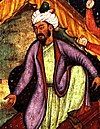Portal:Bangladesh/Selected biography/12
Zāhir ud-Dīn Mohammad, commonly known as Bābur (February 14, 1483 – December 26, 1530) (Chaghatay/Persian: ﻇﻬﻴﺮ ﺍﻟﺪﻳﻦ محمد بابر; also spelled Zahiruddin, Zahiriddin, Muhammad, Bobur, Baber, Babar, etc.), was a Muslim Emperor from Central Asia who founded the Mughal dynasty of South Asia. He was a direct descendant of Timur, and believed himself to be a descendant also of Genghis Khan through his mother. Following a series of set-backs he succeeded in laying the basis for the Mughal Empire.
The Mughal Empire was an important imperial power in the Indian Subcontinent from the early sixteenth to the mid-nineteenth centuries. At the height of its power, around 1700, it controlled most of the subcontinent and parts of what is now Afghanistan. Its population at that time has been estimated as between 100 and 150 million, over a territory of over 3 million square km. Following 1720 it declined rapidly. Its decline has been variously explained as caused by wars of succession, agrarian crises fueling local revolts, the growth of religious intolerance and British colonialism. The last Emperor, whose rule was restricted to the city of Delhi, was imprisoned and exiled by the British after the Indian Rebellion of 1857. (more...)

